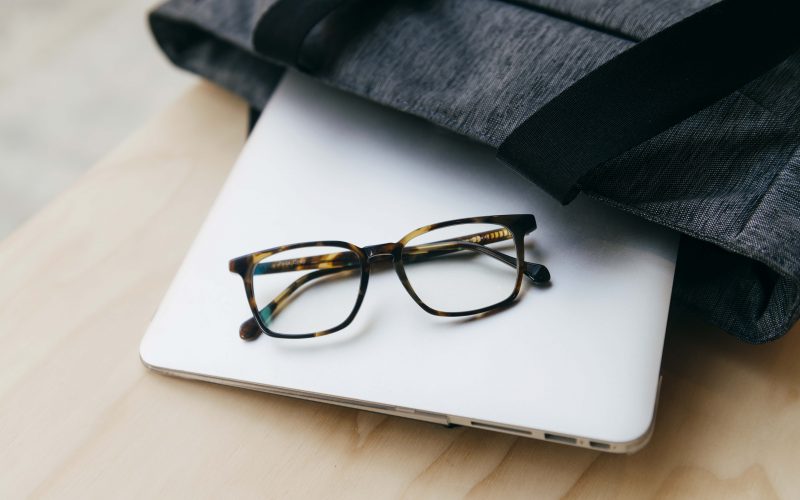You’ve probably heard the words Blue Light being mentioned in the news, on social media, or by your friends and family. You might’ve wondered what that even means or where it comes from. There are a lot of questions out there like “Is Blue Light bad?” “Why is Blue Light bad?” or “Is Blue Light bad for your eyes?” First, let’s start with the basics of Blue Light, what it is, how it works, where you can find it, and how it affects you on a day to day basis.
What is Blue Light?
Let’s start with what Blue Light actually is. Blue Light is the light emitted from the screens that we use on a daily basis like our computers, laptops, phones, and tablets. It has the highest energy wavelengths visible on the light spectrum and sits next to UltraViolet light.
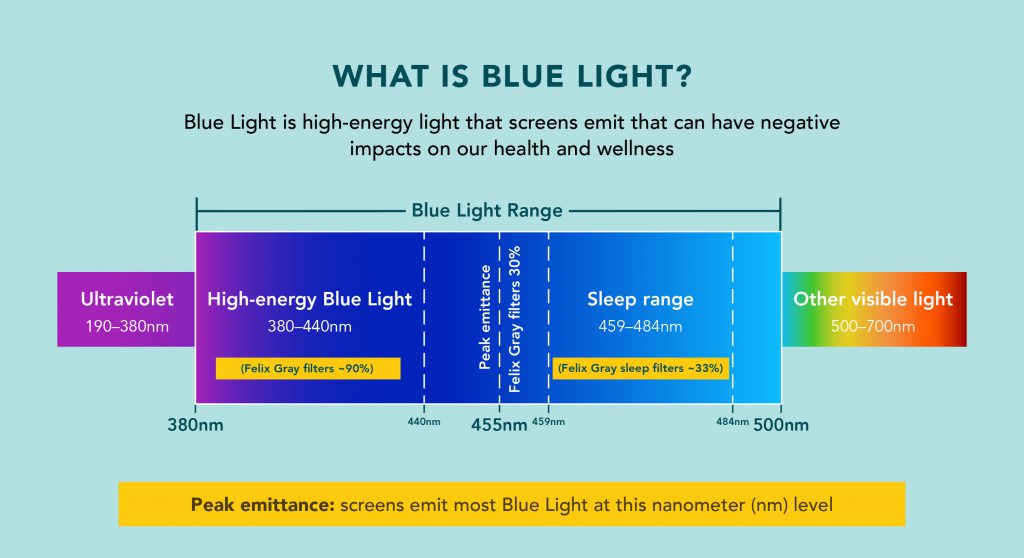
Similar to UV rays, too much Blue Light can cause some uncomfortable effects. Some common signs of excessive Blue Light exposure can include eye fatigue, dry eyes, headaches, blurry vision, and eye strain. You might not realize it, but Blue Light is actually in your life more than you think because of how much time we all spend in front of screens.
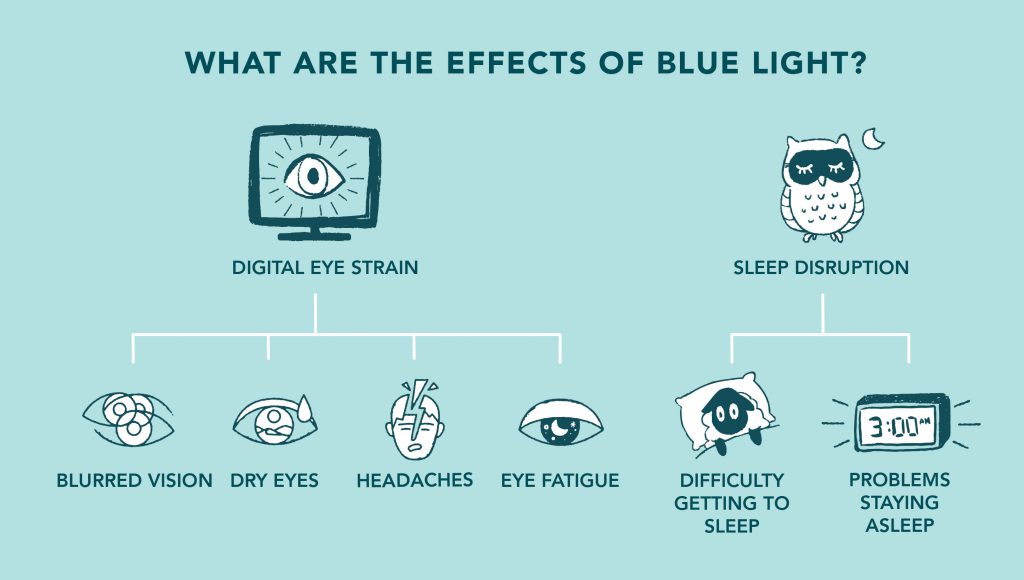
Blue Light can also affect your sleep cycle because it can limit your melatonin secretion. This then will determine how well (or not) you sleep. This is why some people find it harder to fall asleep after staring at their phones in bed for hours. Blue Light is actually shown to decrease melatonin levels, which makes it harder for you to fall asleep. That’s why people recommend trying to reduce your exposure to Blue Light (or even block it as much as possible) in the hours leading up to bed.
What is a Blue Light filter?
Due to the impact of Blue Light on your eye health and overall health, you might be wondering if there is a way to lower your Blue Light consumption and what exactly is a Blue Light filter. There are several ways to filter the Blue Light that is emitted from your screens. The main way to filter out Blue Light is to wear Blue Light filtering eyewear like the ones offered by Felix Gray.
What are Blue Light glasses? These glasses for computer screens have lenses that filtrate the high-energy wavelengths of Blue Light on the visible light spectrum. This means that the glasses work as a sort of barrier between the screen and your eyes to mitigate the symptoms. However, not all Blue Light glasses are equal, so it’s important to understand the difference between a cheap pair of Blue Light glasses that don’t filter where it matters, and Felix Gray.
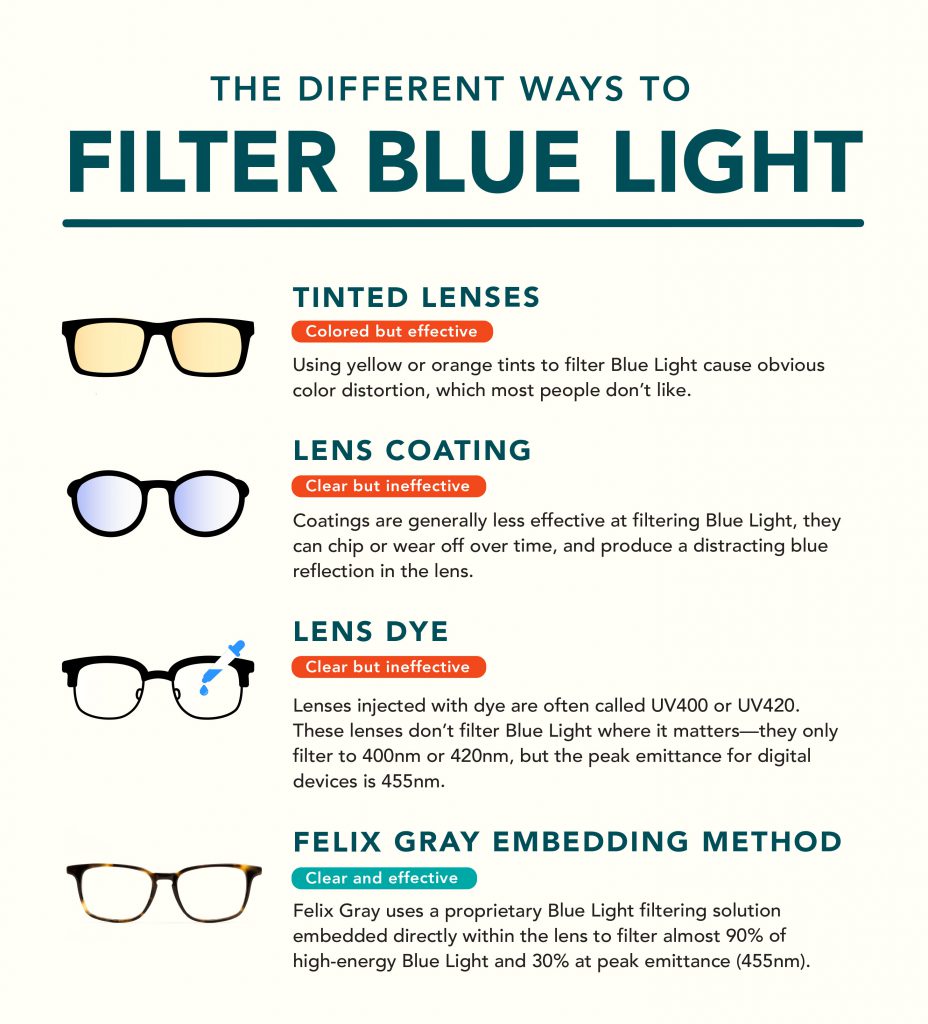

Felix Gray’s proprietary technology is embedded directly into the lens, so it won’t wear off or scratch off over time. Plus, there is not a lens tint, so you can look good and feel good! Felix Gray glasses also eliminate glare, which is another big culprit of Digital Eye Strain. The Anti-Reflective coating blocks 99% of glare so that you can see clearer and your eyes are happier! Blue Light blocking glasses are one of the most popular options for a Blue Light filter. There are also apps and settings on your devices that can be installed to lower the amount of light radiating from your screens.
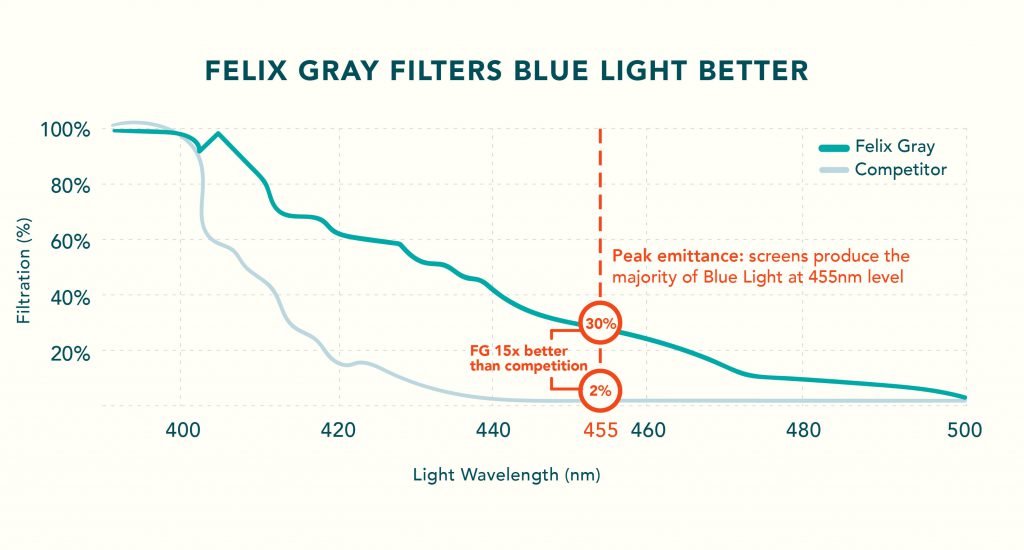
When do you need to wear Blue Light glasses?
While we probably wish we spent only a couple minutes in front of a screen, most of us clock in hours of screen time every day. Since so many people work in front of computers all day long, a big time people wear Blue Light glasses is in the office. In the same breath, a lot of students at American high schools and colleges spend hours a day on their computers and could benefit from glasses for computer screens as well.
However, it’s not just when we’re working that we need to think about wearing Blue Light glasses. When we read books on our tablets, search through Instagram on our phones, watch the new hit show on Netflix, or game with our friends — we could still benefit from Blue Light blocking glasses.

Do Blue Light Glasses Really Work?
Now that we’ve talked about what Blue Light glasses actually are, do Blue Light glasses really work, and do they actually do anything? As we mentioned earlier, it’s important to use Blue Light glasses that filter where it matters.
Blue Light protection is important because it can help ease symptoms of Digital Eye Strain. Most people find that wearing computer glasses reduces these symptoms dramatically and makes sitting in front of a screen much more enjoyable. It is recommended that whenever you are in front of a digital device, you should be wearing Blue Light glasses to help your eyes.
When these glasses become really important is right before bedtime because of the huge effects that Blue Light can have on your sleep cycle. Ideally, we would all shut down our screens hours before we close our eyes for the night, but we know that is just not realistic. So wearing Blue Light filtering glasses, specifically Felix Gray sleep glasses, before going to bed can help to increase melatonin and, therefore, help you get a great night’s sleep.
Our sleep glasses point to a higher range of Blue Light, to naturally help you sleep better and boost melatonin production by 2x. They have a slight lens tint because of the higher light range they target but are perfect for bedtime. In addition to our sleep glasses, we also offer our virtually clear optical glasses that filter Blue Light levels designed to help with Digital Eye Strain (or Computer Vision Syndrome), which consists of headaches, blurred vision, and eye fatigue. Unfortunately, Blue Light is a constant in today’s screen-filled world, but fortunately, Felix Gray’s best Blue Light blocking glasses are here to help us out!
